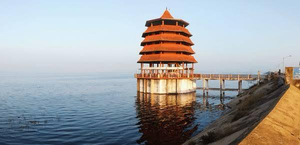Chennai: Chennai and its surrounding areas face a flood risk as the water level in the Chembarambakkam Lake has risen to 21.19 feet.
Officials have warned that if the water level reaches 22 feet, water will be released from the lake, increasing the flood risk for low-lying areas in Chennai and nearby districts such as Kancheepuram and Chengalpattu.
Heavy rains have contributed to the rising water levels in the lake.
Authorities are closely monitoring the situation and have assured the public that all necessary measures will be taken to manage the risk effectively.
Chembarambakkam Lake, located about 25 km from Chennai, is one of the two major rain-fed reservoirs supplying drinking water to the city, along with the Puzhal Lake.
It is to be noted that the Adyar River originates from the Chembarambakkam Lake.
Notably, this artificial lake was first constructed by Rajendra Chola, the son of Raja Raja Chola, and Madeviyar, a prince of Kodumbalur.
The Regional Meteorological Centre (RMC) has issued ‘orange’ and ‘yellow’ alerts for several districts in Tamil Nadu, citing a well-marked low-pressure system over the southwest and adjoining southeast Bay of Bengal, near the Sri Lankan coast.
This system, accompanied by an upper-air cyclonic circulation extending to mid-tropospheric levels, is expected to move west-northwestward towards the Tamil Nadu-Sri Lanka coastline within the next 24 hours.
On Wednesday, Chennai and its neighbouring districts experienced moderate to heavy rainfall, which is predicted to continue over the next 24 hours due to the intensified low-pressure system in the Bay of Bengal.
During the ongoing northeast monsoon season (October 1 to December 15), Tamil Nadu has recorded 14 per cent excess rainfall, receiving 447 mm against the seasonal average of 393 mm.
Chennai recorded 845 mm of rainfall, 16 per cent above average, while Coimbatore saw a remarkable 47 per cent increase in rainfall.
Fishermen have been advised to avoid venturing into the sea, and those already at sea are urged to return to shore immediately.
This alert comes on the heels of Cyclone Fengal, which caused significant devastation in Tamil Nadu and Puducherry between November 29 and December 1.
—IANS


Comments are closed, but trackbacks and pingbacks are open.